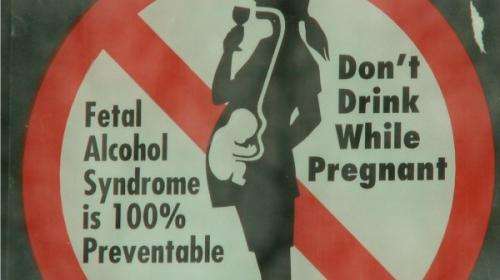Improved community awareness and diagnosis of fetal alcohol disorders has contributed to a doubling of recorded cases across 40 years. Credit: Jen Crothers
The number of recorded cases of fetal alcohol spectrum disorders (FASD) in Western Australia has doubled in the past 30 years, demonstrating improved awareness and diagnosis of the disorder within the community.
A study used the Western Australian Register of Developmental Anomalies to record the number of FASDs in WA from 1980–2010, revealing 210 cases of reported FASDs within the assessed period.
Senior author and Winthrop Research Professor Doctor Carol Bower says there has been limited data on FASD birth prevalence in Australia due to lack of knowledge of the condition.
"Not all health professionals are familiar with the diagnostic criteria for FASD and hence the diagnosis is not made," Dr Bower says.
"There is now an Australian FASD diagnostic instrument being trialled, and over the next year, training and implementation of the instrument will be undertaken across Australia, so we expect there to be improved data of FASD as a result."
Greater willingness to diagnose
Dr Bower says findings from the study will be useful as a comparison in monitoring the effectiveness of the implementation of the diagnostic instrument, which could be particularly helpful to Indigenous communities, given 89.5 per cent of FASD cases were found to be Indigenous children.
"Although a smaller proportion of Aboriginal women drink alcohol than non-Aboriginal women, they tend to drink at higher levels, and high levels of prenatal alcohol exposure increase the risk of the fetus developing FASD," she says.
"Also, and importantly, some Aboriginal communities have publicly declared their concern about FASD, hence there may be a greater willingness to both diagnose FASD and report the cases to the Register."
Dr Bower says the increase in reported cases comes from a growing recognition of the disorder within both Indigenous and non-Indigenous communities, rather than an increase in cases themselves.
"Having good data on FASD helps to advocate for diagnostic and management services for children with FASD and their families, and also in health promotion programs to reduce alcohol use in pregnancy," she says.
"It is important to acknowledge that some women will have an alcohol addiction and will need special support for their own health and that of their baby.
"We also need to ensure that women know about the risks, are encouraged not to drink alcohol in pregnancy and are supported to do so."
More information: "Fetal alcohol spectrum disorders: Notifications to the Western Australian Register of Developmental Anomalies." J Paediatr Child Health. 2014 Nov 20. DOI: 10.1111/jpc.12746. [Epub ahead of print]
Provided by Science Network WA





















